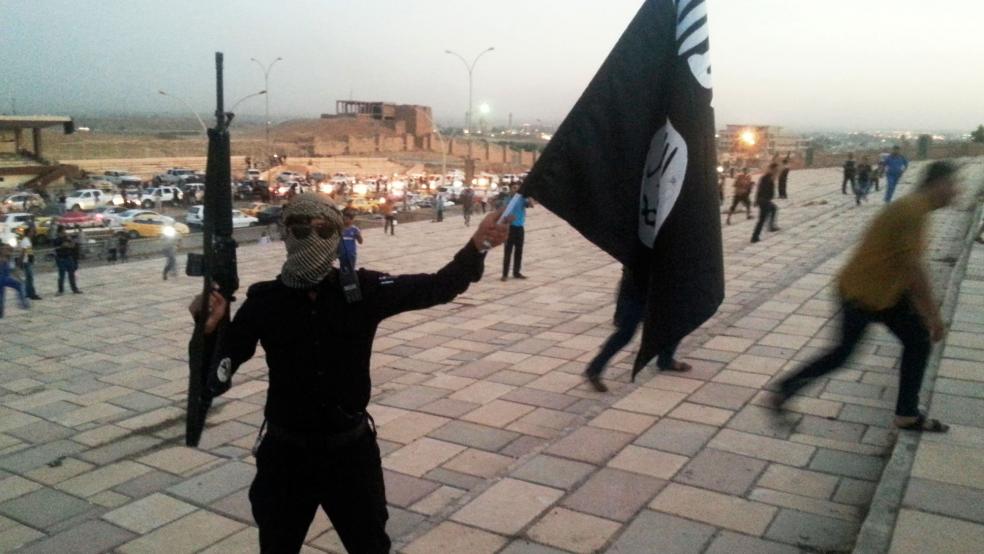President Obama continues to take heat for his comment Thursday, “We don’t have a strategy yet” for dealing with ISIS, the Islamic State of Syria and Iraq.
There’s another controversy brewing that may be just as key – and it has to do with how Obama, other world leaders and the press refer to the extremist offshoot of al-Qaeda.
Related: Obama’s Use of ISIL, Not ISIS, Tells Another Story
What exactly should they be called? Is ISIS simply an army? A marauding terrorist organization? A nation state? Or more?
The terror group currently occupying portions of Syria and Iraq changed its name this summer to the Islamic State, or IS. Rather than use that name or ISIS, however, Obama and some administration members have been calling the group ISIL, which stands for the Islamic State of Iraq and the Levant.
Last Tuesday, for example, Obama said, “Rooting out a cancer like ISIL won’t be easy and it won’t be quick.” On Wednesday, after the group brutally murdered American journalist James Foley, Obama said, “ISIL has no ideology of value to human beings. Their ideology is bankrupt.”
Related: Obama Plays the Long Game on ISIS and Ukraine
On Thursday, during the “no strategy” press conference, Obama said his priority “is to make sure the gains that ISIL made are rolled back and that Iraq” could secure itself. “Clearly, ISIL has come to represent the very worst elements in the region that we have to deal with collectively.”
The president may be making a critical semantic, historical and geopolitical point in his use of ISIL, some experts say.
“In Arabic the name of the group is al-Dawlah al-Islamiyyah fi al-`Iraq wa al-Sham,” Juan Cole, a professor of history at the University of Michigan and author of The New Arabs: How the Millennial Generation is Changing the Middle East, told The Fiscal Times over the weekend. “Dawlah is state, Islamiyyah is Islamic, al-`Iraq is Iraq, fi is in and al-Sham means the area stretching between Iraq and the Mediterranean.”
Historians, said Cole, “sometimes call this area ‘Greater Syria’ or ‘the Levant’ – with ‘Levant’ meaning, in French, ‘the land that rises up from the Mediterranean.’”
Related: The Key to Solving Both ISIS and Russian Aggression
The word existed in “classical Arabic before the modern state of Syria emerged as a French Mandate in 1920,” said Cole. “So sticklers object to calling it ‘Iraq and Syria’ because the group aims to rule Lebanon, Jordan and Palestine/Israel, not just today’s Syria. The ‘Levant,’ a 19th-century European term, does cover all that territory – so Obama seems to prefer the Islamic State of Iraq and the Levant for precision.”
He added that many geographical terms, “including Iraq and Palestine/Filastin, were used in the medieval Muslim world to apply to regions rather than politics. Some have now become identified with modern nation-states,” though the overlap between usages then and now is not usually exact, he said.
“If their name means they have designs on Lebanon, Jordan and Israel, it would be unwise to suggest they’re only interested in Syria. That means the public probably should be prepared for a wider struggle,” Cole said.
Though they call themselves the Islamic State or IS, “no one seems to want to adopt that usage because it concedes too much to them,” said Cole, adding, “I expect most of them to be dead within five years.”
Related: ISIS Gets Turned Back on Social Media and Gets Turned Back
Other experts are wary of putting too fine a point on American leaders’ varying names for the group – with caveats.
“I think you are reaching for meaning that really doesn’t exist,” said Anthony Cordesman, a national security expert at the Center for Strategic and International Studies. “I know quite a number of analysts and officials who use the various terms. Many chose ISIL or ISIS almost at random or have fixed on one over the other with no regard to the words they stand for or the fact that neither is an exact translation of Arabic.”
He added, “Some people prefer ‘Islamic State’ because they feel a state is more of a symbol than a threat. Others feel it is too general.” What’s more important to focus on, in his view, is “how the actual voices in ISIS, ISIL and the IS talk about themselves.”
Cordesman emphasized the formal announcement this summer by ISIS’s leader Abu Bakr al-Baghdadi of the Islamic State’s creation. On June 29, Baghdadi “announced the restoration of the 7th century Islamic Caliphate and officially changed the organization’s title to reflect its status as the new leader of the global Muslim community,” as Foreign Policy reported.
Related: GOP: ISIS's Next Target Is America
“Having already captured swaths of terrain that effectively broke the colonial boundaries separating Iraq from Syria, Baghdadi seized an opportunity to further evolve his cross-border insurgent offensive into a proper Islamic State,” the publication noted.
Cordesman told The Fiscal Times, “He [Baghdadi] gave a press conference dressed as a Caliphon on the first day of Ramadan.” It’s why Cordesman favors a broad focus on how the group has “evolved the names, going back to AQAM [al-Qaeda and Associated Movements] and their split with al-Qaeda – and Baghdadi’s use of symbolism in going to the Islamic State, including conflict maps and geographic descriptions that help sell his ambitions.”
Top Reads from The Fiscal Times:





